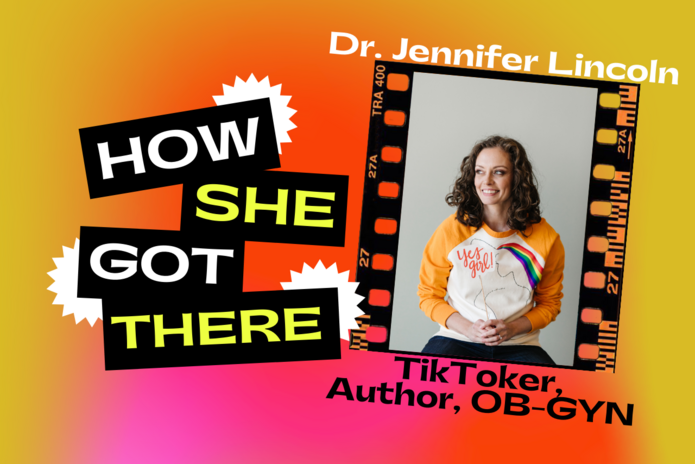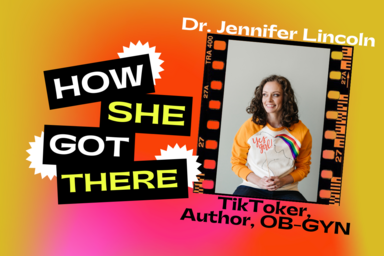In How She Got There, Her Campus interviews the professional role models you look up to most about what it’s like to be in their shoes. This month, TikTok’s Dr. Jennifer Lincoln, board-certified OB-GYN, shares everything you need to know about making it in the medical field and her new book Let’s Talk About Down There: An OB-GYN Answers All Your Burning Questions…without Making You Feel Embarrassed for Asking.
If you’re on TikTok, there’s no doubt you’ve seen Dr. Jennifer Lincoln on your FYP. With 2.3M followers, she’s well-known for her ability to break down complicated sexual health topics so they’re easily understandable to those who need it most; young people who haven’t been given the sex ed they deserve. When she’s not busting sexual health myths, running a sex ed “helpline” in her comments, or responding to TikTok health trends, Dr. Lincoln is busy performing emergency c-sections, responding to other emergencies, and delivering babies. Oh, and writing her very own “shame-free, illustrated guide for people with vaginas” (AKA the grown-up, updated American Girl: The Care and Keeping of You).
Dr. Lincoln graduated from Washington College with a Bachelor of Science in biology and from Tulane University School of Medicine with her M.D. Here, she tells us all about how she got to where she is today – from the importance of what it’s like to be a woman (and a mom) in medicine, and the bad advice given to her by old white men, to the importance of self-care and speaking up for yourself.
Her Campus: What was your dream job when you first chose your major?
Dr. Jennifer Lincoln: My major was biology and I minored in chemistry and English. I was one of those kids growing up who always wanted to go into medicine. There was about a month in college where I didn’t – after my senior year of high school I did something called the National Youth Leadership Forum of Medicine, which is a camp for people interested in medicine. We talked to medical students from Harvard and they were so miserable. I thought that was representative of everybody in medicine and I thought, “You know what? I’ll just be a medical writer,” because I didn’t want to be that miserable. But in one of the first two weeks of taking a microbiology class I was like, “No, I really do want to do this,” but I didn’t know I wanted to be an OB-GYN until I was in medical school doing my rotations.
HC: What was your first entry-level job in the field?
JL: My first job was when I was still in residency, so we were allowed to do some things without supervision as a resident. It was called moonlighting, where you could get a limited medical license to do some work while still in training. I worked in a clinic in a jail where we got to care for incarcerated women who were just so happy to have actual care, and to be treated with respect. It was super fun for me because it was my first job where it was just me; nobody was supervising me and I loved that independence. I learned a lot – including things I didn’t know about jail – and I also saw how some of the guards really disrespected the women, so myself and the other two residents who worked there worked really hard to give them somewhat of a safe space, and to give them the feeling that they had some control in a place where they really had none.
HC: What does a typical day in your job entail?
JL: In the world of an OB-GYN there’s 100% no typical day. I currently work as an OB hospitalist, so I work only on labor and delivery, which is a very unique way of doing my job. When you come out of your OB-GYN training, you can go into a specialty like high-risk pregnancy, infertility, or lots of other things, or you could be a generalist which means that you do a little bit of everything; you’re in clinic, you work on labor and delivery, you do some surgeries. I’ve chosen to focus my practice to just labor and delivery so a typical day for me is that I work 12 hour shifts – either day shifts or night shifts – and when we come on we do our sign on, we see our patients, and we work very closely with the high-risk OB-GYNs on our service. I work at a high-risk hospital – one of the highest level risk hospitals in the state of Oregon – so we see it all. We see patients who are admitted either in labor, or they’ve give birth and we’re caring for them afterwards, or they’re admitted for other complications such as COVID, preterm labor, [or] bleeding. A huge part of my job is that I’m expected to respond to all emergencies, from bleeding to shoulder dystocias to the need for an emergency c-section. Even if they’re not our patients, they become our patients in that moment. We also run a triage unit which is basically an emergency room for pregnant people. They come in [if] they haven’t felt their baby move, or it could be non-obstetric related, like they’re having chest pain or they fell and need monitoring. It’s crazy, it’s high-stress, [and] it’s very fast paced, but I love it. I think it’s a great job for an adrenaline junkie and the people I work with [and I] thrive in uncertainty.
HC: What are you currently working toward?
JL: I think the biggest thing is that my book [just came out], which is awesome and slightly terrifying. That’s really been the focus recently. The “in a typical day,” that’s my hospital job. What I also do when I’m not at work is using social media to educate, writing this book, parenting two kids, all that crazy stuff. I think what I’m working towards now is getting that out there. I’m also heading to Chicago for a medical conference [and] I’m thrilled because it’s the first one we’ve had in person since COVID. I’m on the board of the Society of OB-GYN Hospitalists, so I’m really excited because we’re doing some simulations where we’re practicing emergencies so that when it comes time for them, we’re ready to go. I’m running some of those, and attending lectures, [and also] giving a workshop on social media. It’s kind of a lot all at once, but it’s fun.
HC: What was the writing process like for your book? How did you decide what to include?
JL: I took the most common questions that I got on TikTok – ones that I’ve answered and ones that I wasn’t able to – and broke it down into sections like “Periods,” “Birth Control,” “Care Down There,” [and] “Feeling Good,” and I wrote down questions that seemed to be the most interesting. I also made a TikTok where I didn’t tell people what I was doing – I was like, “Hey I need some help with a project, what do you want to know?” and I took the ones that I got that were the most common. And then I just slowly powered through during the pandemic. When it was safe to be in coffee shops I would go there and write, and I could definitely tell some people were looking at my screen as I was writing about things like “How to Clean Dildos.” I can tell they were like, “What is she doing?” so that was kind of hilarious. It was a very fun process, and it was like my baby that I was pregnant with throughout the pandemic and now I’m giving birth to. Hopefully it’ll be a painless birth!
HC: How did you come to realize that there was a gap in knowledge on sexual health, and what made you strive to fill it?
JL: I mean I’ve always kind of been aware being an OB-GYN that there’s a lot of myths and misunderstandings about our bodies out there. When I started using social media professionally on Instagram to educate, I started to see even more that was out there. I saw other people using the platform who were taking advantage, who claimed they had expertise just to sell things. And then I jumped to TikTok and the floodgates opened of all the garbage that’s out there. While I love TikTok – I use it to educate and I think it’s great – it also is a platform where misinformation can go viral, and we’re seeing that more now on Facebook with COVID.
I was super resistant at first to be on that platform, but my other doctor friends were like, “Jen, you just need to do it,” so I tried it and it worked out and I haven’t looked back. I think that I’m capable of presenting information that can be kind of sensitive, embarrassing to some people, complicated, and breaking it down. I feel like sometimes I’m talking to my younger self, because I did go to an all-girls Catholic school growing up, and I graduated high school with very little understanding of how my body worked and absolutely no understanding of safe sex, consent, or anything like that. I almost feel like I’m giving the information that I wish I had when I was younger.
HC: What do you look for when hiring?
JL: Whenever we need another OB hospitalist, there’s a group of about seven or eight of us [that manage applicants]. The biggest thing that my group looks for is somebody that we can work with, who we want to be with, and in our job it’s very high stress and demands a lot of you. We need to make sure that we’re working with somebody who can keep their cool. And not only be confident, but do it in a caring way. But while what we deal with is a lot of high stress, it can also include a lot of very intimate, private moments for people. We have to have people who can be compassionate even when it feels hard. Truly, the biggest thing is, “Do we like these people and can we have fun with them?” because our job can be kind of crazy and if we can’t laugh or get together outside of work or support each other [or] if someone has a huge ego, we don’t have room for that. All of my partners get along amazingly. We’re all women, which I love. We all chip in and help each other so if somebody’s kid needs to come out of school we’ll just take each other’s shifts. It’s a very special group, and if somebody’s gonna join us then they have to be like that, too, and understand that we all work together.
HC: What are the best and worst pieces of career advice you’ve ever received?
JL: I decided to cut back to part-time work after one year of full-time after residency, because I couldn’t stand how much I was separated from my child. After going through residency I just couldn’t see myself continuing that. The worst piece of advice that I got was usually from old white men who said, “You can’t cut back this early in your career – no one will take you seriously. How will you stay confident? Isn’t that what the nanny is for? Didn’t you know this when you were going into medicine?” I was so sad – I internalized it and I thought, “They’re right.” For the first year or two that I was working part-time – and this was at a separate hospital than where I’m at now – I really struggled. I struggled with feeling like I wasn’t good enough, like I wasn’t a “real doctor,” like I was letting everybody down – and that sucked. As I moved on, I realized that being part-time in medicine is the best decision I’ve ever made – in fact, a lot of people are moving towards that – because doing this full-time would be really hard. So that’s definitely my worst.
I would say my best pieces of advice that I got were from my mentors who were like, “Jen, if this job isn’t the right job for you, find one that is…. Because at the end of the day it’s just a job.” As much as I love my job – and it’s truly a career and a calling – I couldn’t stay where I was and be totally happy. The other piece of advice that my husband has said to me is, “If you die tomorrow, your patients and your coworkers would be sad for a little bit, but it’s your family who would be truly affected,” meaning that, “Yes work is so important, but it’s not the only thing.” You can’t have a false sense of how important you are, because you’re always replaceable. And that’s not bad, because you always realize that it’s okay to take time for yourself.
HC: What’s a career mistake you’ve made, and how did you learn from it?
JL: I didn’t negotiate my salary for my first job out of residency. That’s very common because when you’re a resident you’re making, like, nothing. And then as an attending, it’s a very good salary compared to what you were making. Also we know that women, we just suck at negotiating because we’re taught to be quiet, thankful. We want to be nice. And I should’ve negotiated, I should’ve realized that the first offer is just the first offer. My husband had no problem negotiating every job that he’s had outside of residency, including his first one. Even though he suggested that I should, I was like, “I don’t want to seem ungrateful.” I wish that I had. Every offer is the starting point. It doesn’t matter if you’re 18 or you’re 48 – you know your worth, don’t be afraid to ask for it.
HC: What’s been the most surreal moment of your career thus far?
JL: I think the most surreal moment that I’ve had was truly when my presence saved a life or lives. You know, you go through medical school, you go through residency, and you’re like, “Yes I know, what I’m doing is important.” But that first time that it’s you and nobody else and you’ve identified a problem, you’ve intervened, and you’ve delivered that baby by an emergency c-section in less than a minute and that baby would’ve died if it was four minutes – it’s just kind of surreal. Like, “Holy shit, what kind of job is this?” You’re [also] very thankful for the training that you have and thankful for the team that you have because it really is a team situation.
HC: What advice would you give your younger self?
JL: I would say, “Jen, don’t take everything so seriously.” I was that kid who, starting in the second grade, if they were like, “Write the word two times to learn how to spell it,” I did it five. Some of that was my upbringing, and it paid off. I have a job that I love and am very successful but, especially in college, while I did have fun – I was in a sorority, I wrote for a newspaper, I had great friends – I definitely spent a few too many nights worrying about my grades or my tests, and I wish that I had just realized that I didn’t have to be so serious at the age of 18 or 19. So work hard, but play hard, and give yourself some grace. You don’t have to be perfect. And I say that to my younger self, but I’ll be telling myself this tomorrow when I’m at my conference being like, “Oh, I should’ve said this,” or “I should’ve done that.” So just have grace with yourself.
HC: Who do you look up to?
JL: So many people. If I had to pick one person that I look up to, it’s so cliche, but Kamala Harris. She’s freaking badass. She owns her power, she speaks out, she’s not afraid to do these things, and I imagine there’s still a part of her – that voice in her head – that’s like, “Should I be here?” Maybe there’s some imposter syndrome, but the fact that she’s not afraid to speak her mind is amazing, and it’s making a huge difference for girls who are gonna grow up and be like, “Why can’t I have that job? What’s the big deal?” It’s really important that we start to see more women – especially women of color – in leadership positions, because if we don’t see them then we can’t be them.
Follow Dr. Jennifer Lincoln on Instagram, Twitter, TikTok, and YouTube, and order Let’s Talk About Down There: An OB-GYN Answers All Your Burning Questions…without Making You Feel Embarrassed for Asking on bookshop.org.
This interview has been edited for length and clarity.


